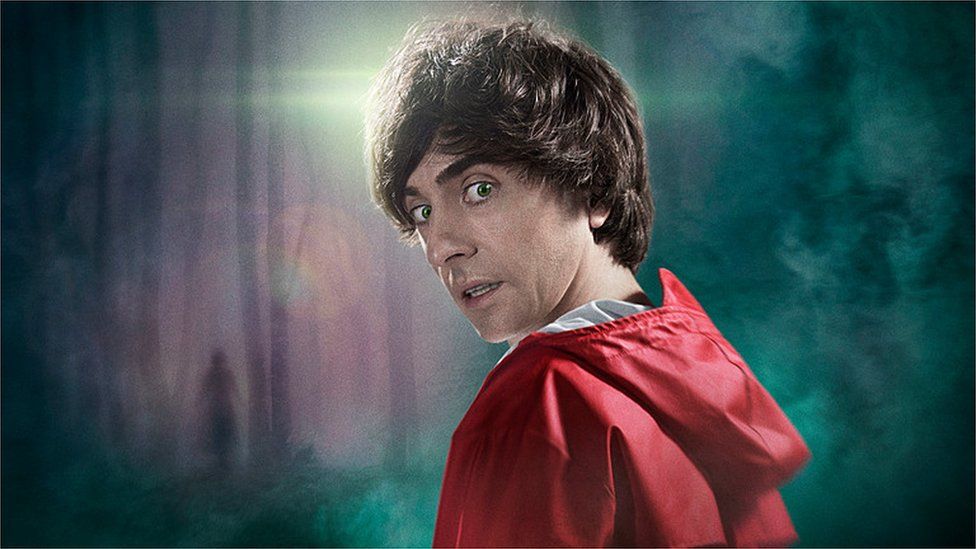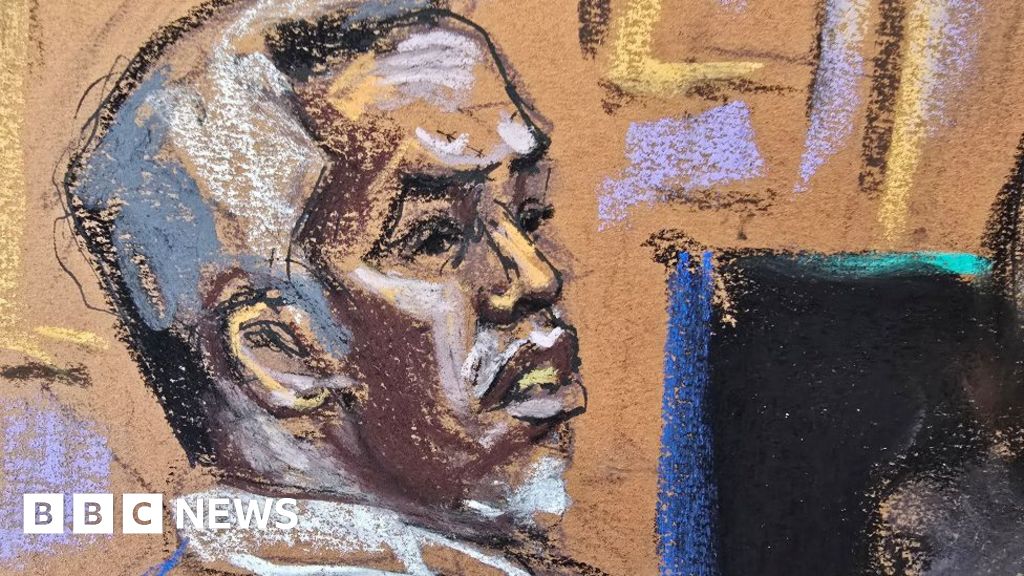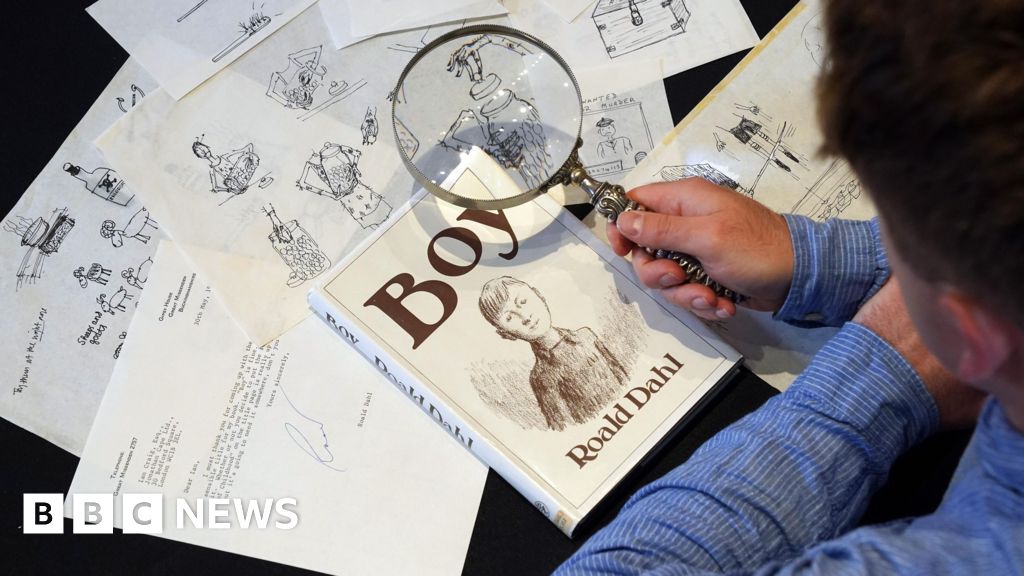ARTICLE AD BOX
 Image source, BBC/Jamie Simonds/Rufina Breskin
Image source, BBC/Jamie Simonds/Rufina Breskin
Danny Robins says his red coat is a homage to one of his favourite horror films, Don't Look Now
By Helen Bushby
Entertainment reporter
Writer and broadcaster Danny Robins says he is "scratching an itch for all of us" by delving into the spooky world of the paranormal, in his upcoming TV series Uncanny.
Like his successful BBC podcast of the same name, Robins explores hair-raising stories of people who think they've encountered a ghost.
"It's people who in many cases hadn't told anybody before, sometimes not even their own partner - and kept this experience buried," he tells BBC News.
They reveal "life-changing moments, where they felt more frightened than they ever have".
Robins always starts his shows with the person and their ghostly experience.
"I'm very careful not to dismiss any story, because even if I feel I can explain it, it meant something to the person," he says.
"What sets my pulse racing is when somebody says to me, 'I don't believe in ghosts, but I think I've seen one'."
He then researches their story, building it up before casting it out to experts and contributors, who offer rational or paranormal explanations, depending on their viewpoint.
He also asks the audience to dive in by posting to the #UncannyCommunity and choosing either "Team Sceptic" or "Team Believer".
Robins started out as a writer, but his career took off after he created BBC podcast The Battersea Poltergeist, telling a real-life ghost story by combining drama and documentary.
Image source, Getty Images
Image caption,Danny Robins: Investigating ghost stories helps him with his need to explore the "mysteries of the universe"
"At the end of it, I said to people, if you have got an experience yourself, send it to me.
"I wasn't really prepared for the sheer deluge of things that came in. It was incredible."
This, he explains, was the catalyst for him to create Uncanny.
Robins' enthusiasm for his work is palpable, not least because he shares it with millions of listeners.
The podcast has been played almost five million times on BBC Sounds, although that figure is the total number of plays across more than 35 episodes. The show has also had three million downloads on other platforms globally in total.
"The idea that [ghost stories] could be real really, really, really grabbed me," he says.
"Lots of people talking to me said, 'I don't believe in ghosts', and so Uncanny grew out of a desire to make sense of these stories and to try and provide answers."
Brought up as an atheist, Robins had a sneaking feeling he may have been "missing out on something".
"I always wondered if there was some other layer of existence, and I was fascinated by belief," he says.
Image source, Getty Images
Image caption,Lily Allen has starred in Robins' hit play 2:22 - A Ghost Story
"Some people would have found God, and I found ghosts. Ghosts became the receptacle for my need to explore the mysteries of the universe."
Asked why it became an obsession, he replies: "I am absolutely terrified of death, and much of my life has been defined by that fear, to a point where it was really debilitating at times."
When he was a student he had what he thought was a heart attack, which turned out to be a panic attack.
"It left me for a good year or more afterwards with this awful, constant fear of death, where I would find myself unable to do anything. Just seeing people and social contact felt impossible, I was so gripped by fear.
"And I think that gave me an insight into what it feels to be haunted.
"It wouldn't take a great psychotherapist to say, 'you're interest in ghosts is linked to your desire not to die'. It's the paradox that if you look at a ghost story, yes, it's frightening, but it offers you this hope."
Image source, Getty Images
Image caption,Laura Whitmore (second left) appeared in 2:22 - A Ghost Story alongside Matt Willis (left), Tamsin Carroll and Felix Scott
Presenter Laura Whitmore, who has starred in Robins' Olivier-nominated paranormal play 2:22 - A Ghost Story, tells the BBC she thinks our interest in the paranormal is because "it's the unknown".
The play, about tensions between belief and scepticism, is about a couple, Jenny and Sam, hosting a dinner party in their new house, which Jenny strongly believes is haunted. It's appeared in London's West End and Los Angeles, and is touring the UK.
Whitmore adds: "There's things you can't answer in life. No one knows for sure what happens when we die, whether you believe there's an afterlife or not. And when we will know, it's too late.
"I'm not scared by the supernatural. I find it a little bit comforting."
Uncanny and 2:22 - A Ghost Story are far from the only shows currently exploring the paranormal.
This YouTube post cannot be displayed in your browser. Please enable Javascript or try a different browser.View original content on YouTube
The BBC is not responsible for the content of external sites. YouTube content may contain adverts.
Skip youtube video by BBC Sounds
Allow YouTube content?
This article contains content provided by Google YouTube. We ask for your permission before anything is loaded, as they may be using cookies and other technologies. You may want to read Google’s cookie policy, external and privacy policy, external before accepting. To view this content choose ‘accept and continue’.
The BBC is not responsible for the content of external sites. YouTube content may contain adverts.
- Bafta-nominated BBC comedy Ghosts, which is on its fifth series, and has been successfully remade in the US
- Comic and actress Catherine Tate is to star in a West End play about the Enfield poltergeist, which is said to have wreaked havoc in a London council house in the late 70s
- Haunted Mansion movie remake, starring LaKeith Stanfield and Tiffany Haddish, and Agatha Christie film A Haunting in Venice, starring Kenneth Branagh, both came out recently
- Paranormal: The Girl, the Ghost and the Gravestone, a show investigating paranormal activity, was also on BBC Three over the summer
Robins thinks there are "definite social reasons" for such a "boom" in supernatural interest, saying when society feels deeply unsettled, people look for answers.
He harks back to the "boom in Spiritualism" after World Wars One and Two, where people tried to communicate with the spirits of deceased loved ones. He also cites use of the Ouija board during the American Civil War and people's interest in demons and witches during the troubled Jacobean era.
The BBC's comedy series Ghosts is so popular it has been remade in the US
Robins thinks today's equivalents of turmoil are "Covid, the existential threat of climate change and war creeping ever closer to us in Europe".
"We are pushed into greater proximity to death than we've been since World War Two," he says.
"When society is horrific, art becomes horrific... We are trying to make sense of it."
Professor Chris French is head of Goldsmiths, the University of London's Anomalistic Psychology research unit.
He also links "times of uncertainty and stress" with more "belief in and engagement with the paranormal".
"For some, such engagement provides a sense of control and understanding that may temporarily reduce psychological stress, even if the sense of control is illusory," he tells the BBC.
'Profound moment'
It's not all doom and gloom though. Does Robins have any positive paranormal stories, which could bring comfort rather than fear?
He recalls a woman who "smelled Lynx Africa in her house" - her husband's scent.
When she smelled it, she felt it was "him coming back and passing on the message to her" in an "incredibly profound moment of feeling she was still in contact with her husband".
"If this is something where you feel you're in tune with your loved one, you don't want to explain that away.
"That's an amazing moment."
Society reflects its turmoil in its art, Robins suggests
As for his forthcoming TV show, he says the longer broadcast time and budget allowed him to really dig deep into the stories he explores.
"We've got cases amongst the best I've ever received," he says.
Careful not to give too much away, he says episode one looks like it's about "one person in one moment" before unfolding into something "much bigger" with "potentially other people in that house who had experiences as well".
There's another case in former mining village Bearpark in County Durham, near where he grew up.
"It's a very sensible, senior teacher talking about this poltergeist activity," he says.
"You can just feel this tremble in his voice, how frightened he still is about it. That really haunts me, I really get a sense of the impact on him."
Robins says he is most proud of the "community the show has built", calling Uncanny life-changing for him.
"I've gone from being this jobbing jack of all trades, to feeling so much more comfortable in myself.
"Now, I've just focused on this one thing that I care about, that I'm fascinated by. Thankfully other people are interested too. It's been an amazing release for me."
Uncanny is on BBC Two on Friday 13 October and BBC iPlayer

 1 year ago
40
1 year ago
40








 English (US) ·
English (US) ·